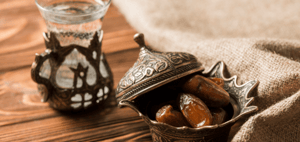Table of Content
- What is Fasting in Islam?
- Ramadan Prayer Time Table 2024
- The Significance of Ramadan in Dubai, Abu Dhabi & Sharjah
- Practices and Customs During Ramadan in the UAE
- FAQ's
- Conclusion
Ramadan holds significant importance for Muslims globally, serving as a crucial month during which they observe fasting, refraining not just from food and beverages but also endeavoring to strengthen their bond with Allah.
In bustling cities such as Dubai, Abu Dhabi, and Sharjah, the essence of Ramadan fills the air, uniting people with respect for this sacred period.
During Ramadan, a rich tapestry of spiritual devotion unfolds, weaving together pre-fast prayers and communal sunset meals that resonate deeply within the souls of Muslims.
As the days progress, anticipation mounts for Eid, a joyous celebration marking the culmination of the fasting journey. Discover the vibrant Islamic fasting customs amid the bustling cities of the UAE.
What is Fasting in Islam?

Commencing the act of Sawm, or fasting, within Islam carries significant weight for adherents worldwide.
-
Positioned as one of the Five Pillars of Islam, fasting during the sacred lunar month of Ramadan is obligatory for adult practitioners, with exceptions granted for circumstances such as ailment, journey, gestation, lactation, menstruation, or senescence.
-
From the crack of dawn (Fajr) until sunset (Maghrib), devotees refrain from consumption of sustenance, libations, tobacco, and conjugal relations.
-
Nonetheless, Sawm surpasses mere corporeal restraint; it symbolizes an odyssey of spiritual refinement, self-discipline, and compassion. By exercising control over impulses and fostering spiritual ascension, Muslims aim to strengthen their bond with Allah (God) and achieve taqwa (God-consciousness).

-
Engaging in fasting nurtures qualities such as self-mastery, endurance, and appreciation, facilitating a disconnection from mundane diversions and encouraging introspection to enhance dedication and reverence. It acts as a poignant cue to demonstrate appreciation for blessings, including sustenance.
-
Apart from its spiritual rewards, fasting also brings about concrete health advantages by supporting detoxification, digestion, and cognitive sharpness, albeit with spirituality remaining its focal point.
-
The Quran and Hadith emphasize fasting's crucial role in nurturing righteousness and closeness to Allah. Surah Al-Baqarah (2:183) elucidates fasting as a tradition observed by preceding nations to nurture piety.
-
Hadiths, the teachings of Prophet Muhammad (peace be upon him), extol fasting's virtues and rewards. For instance, observing Ramadan with faith and anticipation of reward expiates past sins (Sahih Bukhari).
-
Crucially, intention (Niyyah) underpins fasting, symbolizing sincerity towards Allah. Fasting devoid of intention holds no validity, prompting Muslims to renew their intention daily.
-
Before commencing the fast, Muslims invoke dua al-Sahar, beseeching Allah's guidance and blessings, marking a moment of introspection and readiness for a day devoted to fasting and worship.
In essence, fasting in Islam serves as a profound act of devotion, intertwining spiritual and physical dimensions to purify souls, fortify faith, and acknowledge Allah's benevolence.
Ramadan Prayer Time Table 2024
The Significance of Ramadan in Dubai, Abu Dhabi & Sharjah
In the United Arab Emirates, Ramadan holds profound significance, especially in dynamic metropolises such as Dubai, Abu Dhabi, and Sharjah.
It stands as Islam's holiest month, where people embrace fasting, delve into prayers, introspect, and cultivate bonds with fellow beings. Fasting, a cornerstone of the Islamic faith, symbolizes submission to Allah and nurtures spiritual growth.
Ramadan holds profound reverence and anticipation across the UAE. In Dubai, Abu Dhabi, and Sharjah, there's a mix of traditions and cultural events happening all the time. Muslims start fasting early in the morning after a serious prayer. They end their day with another prayer at sunset, usually starting with tasty dates and cool water.
In the final stretch of Ramadan, the last 10 days stand out. Muslims pray more and show devotion. Eid al-Fitr is a big deal—it's the end of Ramadan. It's a happy time when fasting ends. Families and friends come together to eat, say thanks, and give each other presents.
In the Emirates, Ramadan is not only about spiritual contemplation but also emphasizes kindness and assistance to others. Individuals from the UAE and beyond unite to share meals, demonstrate kindness, and support charitable activities, highlighting the importance of compassion and generosity in Islam.
Practices and Customs During Ramadan in the UAE

In the UAE, Ramadan fasting adheres rigorously to the Islamic lunar timetable. The fast commences at the break of dawn, known as Fajr, and extends until the sun sets, marked by Maghrib. Throughout daylight hours, Muslims abstain from consumption of food, drink, and tobacco, and engage in abstention from sinful conduct.
"Iftar" signifies the evening repast when Muslims conclude their fast at sunset. It holds profound social and spiritual importance, serving as a communal gathering where families and communities convene to share a meal. Conversely, "Suhoor" denotes the pre-dawn meal, consumed before the morning prayer, aimed at fortifying individuals for the day ahead.
Observing Ramadan necessitates adhering to appropriate conduct both during fasting periods and meal times. This entails refraining from engaging in gossip, falsehoods, or any detrimental actions. Muslims are further urged to exhibit generosity and empathy, particularly towards individuals facing hardship or adversity.
As twilight embraces the horizon, the sacred moment of iftar unfolds, adorned with the profound dua al-iftar. This prayer, a symphony of devotion, resonates with gratitude towards the Divine for His benevolence throughout the day of fasting.
Starting with the sacred words "O Allah, I fasted for You, and I believe in You, and I break my fast with Your sustenance," it highlights the core of faith, confirming the act of fasting, belief, and breaking fast with the sustenance provided by the Almighty.
In the final stretch of Ramadan, Muslims intensify their spiritual endeavors, particularly during the night. This entails engaging in additional prayers known as Taraweeh, reciting the Quran, and fervently searching for Laylat al-Qadr, the Night of Power, revered as the occasion when the Quran was revealed to the Prophet
Muhammad. Moreover, numerous Muslims undertake Itikaf, a period of seclusion within the mosque, dedicating themselves to worship and introspection throughout these concluding ten nights.
It marks a profoundly auspicious period for seeking forgiveness and deepening one's connection with Allah.
FAQ's
Q1: What are the dua before fasting and the dua of iftar in Islam?
A. Before beginning the fast at dawn, Muslims recite the dua al-Sahar, seeking Allah's blessings and guidance for the day ahead. At sunset, before breaking the fast, Muslims recite the dua al-iftar, expressing gratitude to Allah for sustaining them through the day of fasting.
Q2: Are there exceptions to fasting in Islam?
A. Yes, Islam provides exceptions to fasting during Ramadan in cases of illness, travel, pregnancy, menstruation, lactation, and senescence. Those exempted from fasting are required to make up for missed fasts at a later time or offer fidya, a form of compensation.
Q3: What is the significance of Eid al-Fitr in Islam?
A.Eid al-Fitr is a joyous celebration marking the end of Ramadan, where Muslims express gratitude to Allah for completing the fast successfully. It is a time of communal prayers, feasting, charitable giving, and fostering bonds of brotherhood and sisterhood within the Muslim community.
Q4: What are the significance and practices during the last 10 days of Ramadan?
A. The last 10 days of Ramadan hold special significance as Muslims intensify their spiritual endeavors, seeking forgiveness and blessings. They engage in additional prayers such as Taraweeh, recite the Quran, and strive to find Laylat al-Qadr, the Night of Power. Many also observe Itikaf, a period of seclusion in the mosque for deepening worship and reflection.
Conclusion
In conclusion, Ramadan in Dubai, Abu Dhabi, and Sharjah encapsulates a profound journey of spiritual devotion, communal bonding, and self-reflection for Muslims.
Fasting in Islam is not merely abstaining from food and drink, but a holistic practice encompassing physical restraint, spiritual growth, and gratitude towards Allah.
Ramadan is important to Muslims because it brings them together. It encourages them to care for each other and be generous. Let's remember the lessons of Ramadan.
Let's aim to improve spiritually and demonstrate empathy, kindness, and unity. Wishing everyone a blessed Ramadan! May this special month bring peace and blessings to our hearts and communities.







